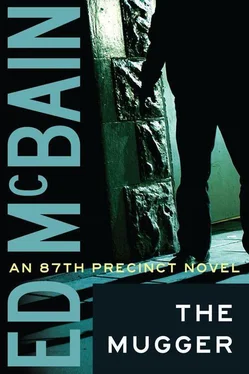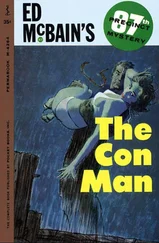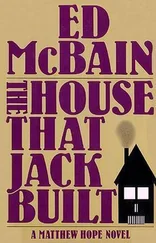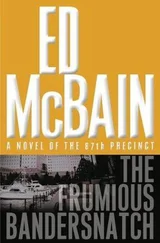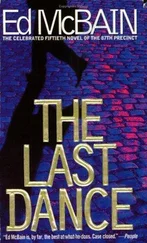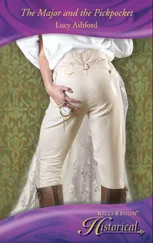“It’ll do you good.”
“Yes. I’m sorry, Bert. I shouldn’t have burdened you with my troubles.”
“Offhand, can you think of anyone who’d accept them so readily?”
“No,” she said immediately. She smiled tiredly.
“That’s better.”
She looked across at him as if she were seeing him for the first time. The tears had put a sparkle into her eyes. “It… it may take time, Bert,” she said. Her voice came from a long way off.
“I’ve got all the time in the world,” he said. And then, almost afraid she would laugh at him, he added, “All I’ve been doing is killing time, Claire, waiting for you to come along.”
She seemed ready to cry again. He reached across the table and covered her hand with his.
“You’re… you’re very good, Bert,” she said, her voice growing thin, the way a voice does before it collapses into tears. “You’re good, and kind, and gentle, and you’re quite beautiful, do you know that? I… I think you’re very beautiful.”
“You should see me when my hair is combed,” he said, smiling, squeezing her hand.
“I’m not joking,” she said. “You always think I’m joking, and you really shouldn’t because I’m… I’m a serious girl.”
“I know.”
“So—”
He shifted his position abruptly, grimacing.
“Is something wrong?” she asked, suddenly concerned.
“No. This goddamn pistol” He shifted again.
“Pistol?”
“Yes. In my back pocket. We have to carry them, you know. Even off duty.”
“Not really? A gun? You have a gun in your pocket?”
“Sure.”
She leaned closer to him. Her eyes were clear now, as if they had never known tears or sadness. They sparkled with interest. “May I see it?”
“Sure.” He reached down, unbuttoned his jacket, and then pulled the gun with its leather holster from his hip pocket. He put it on the table. “Don’t touch it, or it’ll go off in your face.”
“It looks menacing.”
“It is menacing. I’m the deadliest shot in the 87th Precinct.”
“Are you really?”
“‘Kling the King,’ they call me.”
She laughed suddenly.
“I can shoot any damn elephant in the world at a distance of three feet,” Kling expanded.
Her laugh grew. He watched her laughing. She seemed unaware of the transformation.
“Do you know what I feel like doing?” he said.
“What?”
“I feel like taking this gun and shooting out that goddamned Spry sign across the river.”
“Bert,” she said, “Bert,” and she put her other hand over his so that three hands formed a pyramid on the table. Her face grew very serious. “Thank you, Bert. Thank you so very, very much.”
He didn’t know what to say. He felt embarrassed and stupid and happy and very big. He felt about eighty feet tall.
“What… what are you doing tomorrow?” he asked.
“Nothing. What are you doing tomorrow?”
“I’m calling Molly Bell to explain why I can’t snoop around anymore. And then I’m stopping by at your place, and we’re going on a picnic. If the sun is shining.”
“The sun’ll be shining, Bert.”
“I know it will,” he said.
She leaned forward suddenly and kissed him, a quick, sudden kiss that fleetingly touched his mouth and then was gone. She sat back again, seeming very unsure of herself, seeming like a frightened little girl at her first party. “You… you must be patient,” she said.
“I will,” he promised.
The waiter suddenly appeared. The waiter was smiling. He coughed discreetly. Kling watched him in amazement.
“I thought,” the waiter said gently, “perhaps a little candlelight at the table, sir? The lady will look even more lovely by candlelight.”
“The lady looks lovely just as she is,” Kling said.
The waiter seemed disappointed. “But…”
“But the candlelight, certainly,” Kling said. “By all means, the candlelight.”
The waiter beamed. “Ah, yes, sir. Yes, sir. And then we will order, yes? I have some suggestions, sir, whenever you’re ready.” He paused, his smile lighting his face. “It’s a beautiful night, sir, isn’t it?”
“It’s a wonderful night,” Claire answered.
Sometimes they crack open like litchi nuts.
You struggle with something that seems to be a Brazil nut, poking at the diamond-hard exterior, yearning to get at the meat, and suddenly, it’s a litchi nut with a fragile, paper-thin skin, and it bursts open under the slightest pressure of your fingers.
It happened that way with Willis and Havilland.
The Three Aces that Sunday afternoon, September 24, had barely begun picking up business after its late opening. There were a few drinkers at the bar, but the tables were empty, and both the snooker table and the bowling pinball machine were empty of players. The bar was a rundown joint with three playing cards painted on the mirror: the ace of clubs, the ace of hearts, and the ace of spades. The fourth ace was nowhere visible. Judging from the looks of the bartender, it was probably up his sleeve, together with a fifth ace.
Willis and Havilland took stools at the end of the bar. The bartender lingered with the drinkers at the opposite end of the bar for a few minutes, then slouchingly pulled himself away from the conversation, walked to Willis and Havilland, and said, “Yep?”
Havilland threw the match folder onto the bar. “This yours?”
The bartender studied it at great length. The identical three aces on the mirror fronted the match folder. The name Three Aces was plastered on the cardboard in red letters a half inch high. The bartender nonetheless took his time.
At last, he said, “Yep.”
“How long have you been stocking them?” Willis asked.
“Why?”
“We’re police officers,” Havilland said wearily. He reached into his pocket for his shield.
“Save it,” the bartender said. “I can smell law at sixty paces.”
“Is that how you got your nose broken?” Havilland asked, clenching his fists on the bar top.
The bartender touched his nose. “I used to box,” he said. “What’s with the matches?”
“How long have you stocked them?”
“About three months. It was a big bargain. There’s this kid in the neighborhood, sells Christmas cards and like that. Came around saying the matches would give the joint a little class. So I tumbled. Ordered a couple gross.” The bartender shrugged. “Didn’t do no harm, as I can see. What’s the beef?”
“No beef,” Willis said. “Routine check.”
“On what? Matchbooks?”
“Yeah,” Havilland said. “On matchbooks. Do you sell cigarettes?”
“Only in the machine.” The bartender indicated the vending apparatus in the corner near the door.
“You stock these matches in the machine?”
“No. We keep ‘em on the bar in a small box. Anybody runs out of matches, he comes up and grabs himself a book. Why? What’s so important with the matches?”
“We’ll ask the questions,” Havilland said.
“I’m only trying to help, Officer,” the bartender said. His voice conveyed the distinct impression that he would have liked nothing better than to punch Havilland in the mouth.
“Then anyone who drinks here can walk up to the bar and help himself to the matches, right?” Willis asked.
“Yep,” the bartender said. “Makes it homely, don’t you think?”
“Mister,” Havilland said evenly, “you better wipe that wise-guy smirk off your voice, or something’s gonna make you homely.”
“Cops have always scared me,” the bartender said dryly, “ever since I was a wee babe.”
“If you’re looking for a fight, pal,” Havilland said, “you picked the right cop.”
Читать дальше
